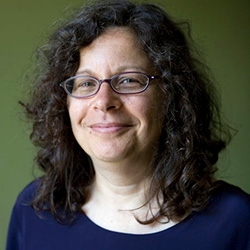

NVC Resources with Miki Kashtan
-
How DO we live our lives? What is an effective response to what is happening in the world? Listen in as Miki dialogs with a participant asking, "What is mine to do?", and honors the dissonance we feel when working to change.
-
2020 has added three major global crises to our long and painful list of ongoing challenges:
- Public health crisis emerging from the Coronavirus infecting humans;
- Governance crisis manifesting especially in global protests against police brutality and governments more generally; and
- Economic crisis unfolding from responses to the pandemic.
And as a result, many of us who share NVC with others have been feeling a growing unease about our roles. I have heard from quite a few who want to go beyond using NVC primarily as a personal growth tool within the market economy, and often don't know how to do so. This course is designed to respond to this need by supporting anyone who shares NVC with others – regardless of experience or certification – in opening to the way systemic perspectives deepen and transform how we bring NVC to people, communities, and organizations.
-
If you’ve ever dreaded attending a meeting – or watched in dismay as your group collapses into conflict – know that a methodology known as Convergent Facilitation offers you possible solutions.
It’s based on one simple experience: that people come together at the level of their underlying principles, needs, aspirations, and dreams, not at the level of their surface positions.
Convergent Facilitation is a highly efficient decision-making process developed by Miki Kashtan from the principles of Nonviolent Communication. It enables you to look beneath the surface and find the essence of what’s important to different stakeholders, and bring it together into one set of principles that lead to proposals and ultimately decisions. As a result, it readily produces solutions and decisions that everyone can embrace.
-
Ever since the Women's Movement of the 60s and 70s, we have known that "the personal is the political" – that individual suffering and challenges often have their source in the social systems within which we live.
How can we mobilize this insight in support of our own and others' healing?
Join Miki Kashtan for this course designed to shed light on how the social context into which we are born affects our experience, and what we can do about it at the individual level within the paradigm of nonviolence.
-
What does nonviolence have to do with group facilitation?
Miki Kashtan believes that nonviolence is a way of being and living that orients us in all our thoughts, words and deeds toward the integration of truth, love and courage. All nonviolent individual and collective actions are aimed at preserving what serves life and challenging what does not. Facilitation is one clear path for bringing nonviolence to the world!
How can we act now, as facilitators, as if the world of our dreams, the Beloved Community, is already in place?
-
Each of us has a range of capacities. Miki Kashtan describes this as a range from "floor to ceiling." Floor capacity is what happens when you hit your limitation, ceiling capacity is when you are closest to functioning in line with your values and vision. This video describes the need to work on both to prevent the gap from expanding.
-
Empathy alone can be unreliable in guiding compassionate action. As seen in historical events, military training, personal anecdotes, and scientific experiments, empathy alone may not prevent people from harming others. A sense of duty or obedience, often instilled through fear of punishment and shame, might inhibit empathic action. The antidote may be to fostering empathy without resorting to control, shame, or punishment.
-
So many of us have a habitual response of trying to eliminate uncertainty and the arrival of what we don't want. Alternatively, we can embrace the irreducible uncertainty of life. This shift from resistance and helplessness to mourning allows acceptance of outcomes, reduction of stress, and opens the door to noticing and appreciating what's present and available amidst challenges.
-
In uncertain times, when facing important life decisions, it's common to get caught up in imagining various scenarios and potential outcomes. The desire to predict and control the future often gives a false sense of security. The key is to make decisions based on the information available now, minimizing the number of irreversible choices. This approach maintains focus on what is known and prevents getting lost in the unknown. Rigor is essential, especially when familiar pathways don't align with desired values. In times of high stakes and uncertainty, such as dealing with a health crisis, the challenge is to resist the urge to speculate on countless possibilities and instead concentrate on the facts at hand. Miki Kashtan shares how staying in the present and acting on what is currently known provided a practical and grounded approach which allowed her to stay present throughout her sister's, Inbal Kashtan, journey with cancer.
-
So many of us have been taught to solve conflicts by what is “fair.” However, Miki Kashtan states that fairness is a separating concept. In this video, she describes how when we do not have the conditions to care for all needs involved, when we live within separation, fairness is second best. 
-
Read here about patriarchy as a system, its impact on men and women, how its rooted in separation and control, leading to dominance and submission. Under patriarchy, even men are brutalized. Instead, we can embrace nonviolence to challenge patriarchy and its offspring (eg. capitalism, child trafficking, etc). And to make a lifelong commitment to undo socialization, act within our influence, and work towards liberation of all.
-
Historically, work, education, resources, land, animals, and relationships were intertwined, shattered by capitalism and industrialization. We transitioned from communal self-sufficiency to individualism, industry, and smaller families. To avert extinction and thrive, we need to reconstruct social systems, emphasizing the commons, uniting communities with the land and resources in interdependent, regenerative harmony.
-
The human species is trained and habituated towards separation. This model encourages humans to either give up on their needs or fight for their needs. In this short video, Miki shares how increasing capacity shifts habits of separation and supports holding of all needs. Through intensive lifelong practices we learn to increase our capacity to receive and to increase our capacity to be generous supports our overall capacity to hold all needs.
-
Total inclusion is impossible: inclusion of all can often lead to exclusion of those who can't bear the behaviors of some. Many groups flounder and disintegrate because of too much inclusion. Limited resources and capacities may make it necessary to exclude. Keeping more coherent shared values and strategies may be another reason to place membership conditions so that what appears to be exclusion may give movements a chance to expand.
-
Most people want to punish perpetrators of sexual violence. Unfortunately, punishment doesn’t lead to lasting widespread change. Rather, we can identify root causes and conditions that sustain violence. That means shifting from individual to systemic lenses, and from punitive to restorative responses. It means collective learning about how such acts are nurtured and persist. This can reduce the chance of it happening again.
-
Whether privileged or not, its not easy to see the humanity of others in different social locations, especially if their actions have unwanted impacts and have left behind our humanity. Aiming for “both sides hearing each other” empathically, and to focus on effect rather than intent when we have more privilege, may theoretically lead to liberation. Yet, in practice it can reinforce rather than transcend power differences -- unless there's specific ways to focus attention and choice. Here, its important to transform expectations into working with willingness, and within our own terms and timetable.
-
The word "privilege" signifies the benefit to the person having it, and the relationship between that person’s benefit and others' lack of benefit. When privileged, there are incentives to not see this interdependent link. For instance, it's easier for the wealthy to think of the poverty of many and the wealth of some are unrelated. If the wealthy want to keep wealth they would need to continue with approaches rooted in this separation.
-
Whether we have more or less power and privilege, anything without liberation for all is within patriarchal separation, and will continue cycles of oppression. To liberate ourselves and one another we need to increase our collective capacity through developing related knowledge, skills, research; build an understanding of patriarchal roots; confront lovingly; co-hold dilemmas about privilege; co-shape outcomes; etc.
-
The human species is trained and habituated towards separation. This model encourages humans to either give up on their needs or fight for their needs. In this short video, Miki shares how increasing capacity shifts habits of separation and supports holding of all needs.
-
When we have privilege, we can have access to resources resulting from legal or social norms related to membership in a group -- independent of any (in)action, awareness of the disparity, the potential benefits to us, or the costs to others. Unhelpful ways of engaging with privilege are: denial/invisibility, guilt/shame, defensiveness, and entitlement. Helpful ways of engaging are: owning privilege, learning about privilege, opening to feedback, and stewarding privilege for benefit of all. To be helpful we need to engage with necessary (rather than unnecessary) discomfort.

Quick Links
Subscription Preferences
Stay In Touch!
Looking for ways to keep up with NVC Academy news, get special offers, free resources, or words of inspiration? Here are five ways to stay engaged:
















